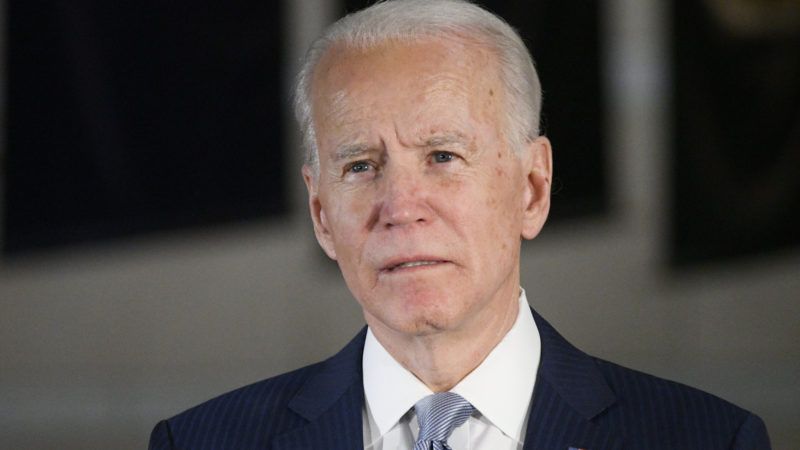Joe Biden Throws Support Behind Disastrous California Gig Economy Law
A.B. 5 has caused chaos in the Golden State.

Joe Biden, the former vice president who last night basically cemented his front-runner status for the Democratic presidential nomination, has thrown his support behind Assembly Bill 5 (A.B. 5), the disastrous gig economy law in California that has even drawn the ire of many progressives.
I support #AB5 in California, which will give workers the dignity they deserve in the workplace. I agree with @transportworker that we can't let corporations undermine basic rights by adding these exemptions to ground-breaking legislation. https://t.co/bouzgRLBU7
— Joe Biden (@JoeBiden) March 7, 2020
His announcement, made over the weekend, is another reminder that the career politician has often expressed unequivocal support for the liberal issue of the moment, no matter what types of unintended consequences it might create.
At the core of A.B. 5 is an attempt to force companies to classify contractors as employees. It enshrines into law the "ABC" standard—affirmed in Dynamex Operations West, Inc. v. Superior Court of Los Angeles—which makes it a near-impossible feat for companies to keep contractors on the payroll. According to A.B. 5, a contractor must control their workload, perform duties outside of the company's primary scope, and be "customarily engaged" in an independent trade or profession.
While well-intentioned, the measure upended several sectors of California's gig economy before A.B. 5 became law on January 1 of this year. Freelancers—from transcribers and translators to journalists and content creators—were initially prohibited from completing more than 35 individual assignments for a single outfit without being hired as an employee, a cap that Assemblywoman Lorena Gonzalez (D–San Diego) said was somewhat "arbitrary" in nature. It sparked a massive outcry, with many of those workers complaining that the law had decimated their livelihoods.
"Companies can simply blacklist California writers and work with writers in other states, and that's exactly what's happening," Alisha Grauso, an entertainment writer and the co-leader of California Freelance Writers United (CAFWU), told Reason in December. "I don't blame them."
Gonzalez disagreed. "These were never good jobs," she wrote in a now-deleted tweet. "No one has ever suggested that, even freelancers."
Except that was patently untrue. The assemblywoman eventually carved out an exception for the industry—one of many—after upset freelancers shared a slew of stories about how A.B. 5 posed an imminent threat to their way of life. For many, the carveout came too late, with thousands of dollars in contracts already lost.
Other professions that have been granted exemptions include doctors, lawyers, architects, engineers, accountants, insurance brokers, hairstylists, and real estate agents.
With the laundry list of exempted workers, the legislation is nothing short of cronyism, granting favors to some while targeting others. It's no secret that A.B. 5 primarily zeroed in on the gig economy tech behemoths—Uber, Lyft, DoorDash, and the like—whose flexible business models have vexed left-leaning lawmakers. Those companies are hoping that voters will save them in November with a ballot measure for which they have reportedly collected more than one million signatures.
If they fail, the sharing economy in the Golden State will cease to exist in its current form. Businesses are legally obligated to provide employees with a slate of benefits, such as a minimum wage, compensation for expenses, paid time off, and health care—an untenable change for a business model that is open to nearly anyone who wants to participate and relies on empowering workers to log on whenever they please. Labor costs are estimated to increase by 20 to 30 percent. As I reported last month:
Under a 40-hour workweek, Lyft expects to kick 300,673 drivers to the curb if it experiences the more modest 20 percent increase in expenses, according to a Beacon Economics LLC study commissioned by the ridesharing company.
But with all these problems, Biden still supports the legislation, tweeting that a victory for the gig economy in November would be a loss for its workers. That logic is difficult to square with reality when considering that gig economy work contains fewer barriers to entry than other occupations. Accordingly, it allows more vulnerable populations—like immigrants and those who may have recently lost a job—to set their own hours and make decent income.
Biden's love for A.B. 5 shouldn't come as a surprise. The former vice president has a track record of propping up problematic policies without giving full consideration to how they will impact people in real-time. In some instances, he's had to distance himself from those very ideas decades later. Take the 1994 crime bill, which implemented the controversial "three-strikes" rule and sent many people to prison for life if they were convicted of a violent felony after two other past offenses (including drug crimes).
That legislation has been lampooned by Republicans and Democrats alike, but it's worth remembering that Biden was a driving force behind it—something that would come back to haunt him for years as he attempted to dodge accountability. Earlier this year, he admitted it was a "big mistake."
Should Biden ascend to the Oval Office and fight for gig economy measures like A.B. 5, one wonders if he'll be issuing similar mea culpas in a few years after witnessing their awful consequences.

Show Comments (29)